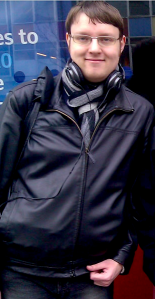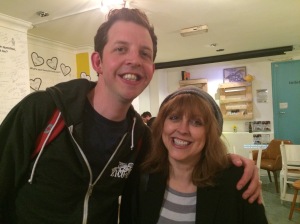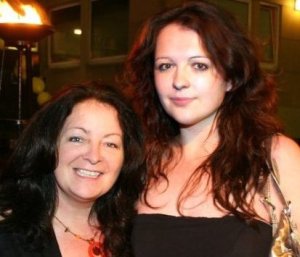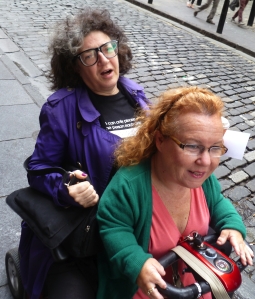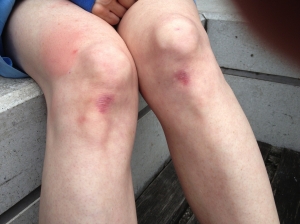
So I have been talking to a man whose real name I do not know. He performed as Wavis O’Shave on the 1980s Channel 4 TV music series The Tube, often in bizarre comedy sketches as ‘The Hard’. But he has also appeared as Foffo Spearjig, Pan’s Person, Mustapha Dhoorinc, Mr Haggler, Howay Man and many more.
In 1994, on Granada TV’s show Stars in Their Eyes, he appeared as ‘Callum Jensen’ impersonating glam rock star Steve Harley,
Before The Tube, in 1980, he had recorded an album called Anna Ford’s Bum referring to the TV newsreader and, in 2004, he recorded a CD single Katie Derham’s Bum referring to another TV newsreader.
In 2021, he wrote and recorded what he claimed was the world’s first palindrome song Mr Owl Ate My Metal Worm.

Nameless talked to me via FaceTime (in a theatrical wig)
JOHN: Because it was screened at an awkward time, I almost never saw The Tube, so I’m fairly unaware of your extensive fame.
WAVIS: A lot of people, if you mention my names, they say: “Oh yeah, The Tube! Oh yeah, Anna Ford’s Bum! Oh yeah, The Hard!”… and then the missing years. They think I’m either dead or in prison. They don’t realise that, sporadically, I just erupt and record a song or do something else that warrants attention, then I disappear.
JOHN: At heart, you’re basically a music person…?
WAVIS: Well, Wikipedia says I’m a comedian and a musician. People always ask: “What are you? Performance artist? This, that, whatever?” And I say: “I’m a Wavis O’Shave.”
JOHN: In 2004, Chris Donald of Viz magazine said you’re not a musician, you’re not a comedian, you’re “a sort of cross between Howard Hughes,Tiny Tim and David Icke”.
WAVIS: Well, Malcolm Gerrie, the producer of The Tube, said I’m a mixture of Arthur Askey, Charlie Chaplin and Lee Evans. That’s a bit more credible, isn’t it? And he knew me quite well. But, really, I’m a fat, skinny nowt, if that’s helpful.
JOHN: Nowt? Sounds like a plug for your own alleged autobiography I Felt Nowt. I typed that title into Amazon and it came up with ‘felt roll’ which was, indeed, a page for a roll of felt.
WAVIS: Yeah. I’m quite happy with that. It only goes up to 2013, I think, and I’ve had some amazing adventures since then.
JOHN: You think?
WAVIS: I haven’t read it for ages…
JOHN: You have read your autobiography?
WAVIS: I have. It starts at the beginning of my illustrious media ‘career’ – around 1975.
People wanted me to get it in book form but I thought I couldn’t justify it. The thing is, John, people wouldn’t believe it past Page 10. They would think it was made up. A fiction, because my life has been so ‘alternative’.
JOHN: You were very matey with Simon and Chris Donald of Viz…
WAVIS: Yes. I had quite a lot of interaction with Viz at the time and was their Patron Saint. They visited me at my mothers’ ‘bit of shanty’ once and she told them all about her visits from the god Pan whom I’d summoned. I can’t recall what he was being summoned for, maybe for not having a portable sheep pen licence.
JOHN: You have been called a “forgotten hero of the North East”.
WAVIS: I’m not forgotten!!! Those people! I’m not kidding. The name Foffo Spearjig has been nicked and used by so many people. There’s two Wavis O’Shaves on Facebook who are not me. It’s all out of control. Always has been.
JOHN: You have done ‘Celebrity Ambusahes’. You harried Debbie Harry. There’s a photo.

WAVIS: I’m living in the North East at the time and friends are watching their heroes and heroines on telly and I tell them: “Why don’t you go and meet them? You can!” And they didn’t.
It started for me with Debbie Harry; then it was Britt Ekland and so on.
At the time, Debbie Harry was the hottest pop act on the planet and you weren’t allowed to take photographs because they had their own photographer. So I asked Chris Stein: “Any chance?” And he went and asked her and he came back and said: Well, yeah. It’s fine so long as you promise you won’t sell ‘em.
So I was lucky to get those photographs, but I didn’t just want to stand next to her so, out of my back pocket I got something like a 5’9” polystyrene nose and we took the picture.
JOHN: You had a very big back pocket.
WAVIS: I do.
At the time, I’d released some vinyl and both the NME and Sounds picked up on it and were praising me and normally the NME and Sounds were deadly enemies like Celtic/Rangers. But they both loved Wavis, so I was getting lots of good press regularly and, when I took these pictures from what I called Celebrity Ambushes, they would appear.

Anna Ford’s Bum led to the Sunday People…
I ended up on the front page of the Sunday People with Anna Ford, which was quite a big thing. She was the gentleman’s top totty at the time and here’s this ragamuffin from Up North singing about her bum in a national newspaper.
My last celebrity ambush was only a couple of months ago – Harry Hill. I mentioned our mutual friend Gary Bushell and told him: “Gary said many years ago that Wavis was Harry Hill before Harry Hill was Harry Hill, but, mind you, you’re not a bad Harry Hill anyway.”
That was the last one. The next-to last one was Tyson Fury, the World Heavyweight Boxing Champion. I laughed all the way home after that. What had I been doing? I’d been in the middle of all these really massive blokes, sense of humour not that prominent, and I’m wanting him to sign a poster of The Hard.
JOHN: How did Tyson react?
WAVIS: My success rate has always been 99.9%, catching people one-to-one. But he was surrounded by his bouncer folks and one of them just took one look at me with me ‘Hard’ poster and said: “He doesn’t do autographs”.
Then, as he went into the building, we exchanged glances… I have stared him out, technically… he went into the building and signed autographs for these VIP people who paid £320 to get them! That’s Showbusiness, folks!
JOHN: So you didn’t get one.
WAVIS: Well, I didn’t really want it. I just wanted to be there because it was ridiculous. What was I doing there?
Locally, up North, the first celebrity I ever mixed with was Spike Milligan around 1975/1976.

“The idea was to play anything that wasn’t music.”
I had a group I called the Borestiffers. We did a ‘world tour’ of two dates at our local hall in Southshields. I had to fill in a form. I said it was for ‘poetry recitals’. All the rival gangs came – they’d kill each other on sight – and the hall was quartered by all these rival gangs who had come to see what on earth was going on. They didn’t know what to expect.
I came out with an illuminated Subbuteo floodlight strapped on my head with my wacky little band and I’m doing my songs and I just managed to finish it before the chairs started getting thrown at each other from the rival gangs.
The idea of the Borestiffers was to play anything that wasn’t music. We had empty suitcases for drums, Bullworkers and we genuinely had a kitchen sink, because someone was having their kitchen done. We had everything and we freaked everybody out so much that they didn’t know how to react.
I thought: Right! I like this reaction!
JOHN: …and so you decided to do comedy?
WAVIS: People want me to be a comedy/haha person. But nobody’s one person.
On the day Elvis died – 16th April 1977 – I went up to Dumfries and joined the Tibetan community there – the same one David Bowie went to ten years earlier with Tony Defries. The Kagyu Samye Ling Monastery.

The Samye Ling Temple at Eskdalemuir in Scotland (Photograph by Robert Matthews)
JOHN: I’ve been there.
WAVIS: I met the Dalai Lama there in 1994.
JOHN: He’s a bit of a giggler, isn’t he…
WAVIS: He can’t stop laughing… Anyway, I studied there and had a lama teacher – a celebrated rinpoche – Akong Rinpoche. He was murdered in China in 2013. I had Akong as a teacher in 1977 and I seemed to already know the stuff. What I got into was a thing called Vajrayana – you may have heard of the ‘crazy wisdom’ of Vajrayana.
It kind of frees outrageous behaviour.
I thought: This is the way I seem to be. Polar opposites. I’m up here at the apex, sitting with the emptiness of the Vajra diamond and the supreme oblivion where you can really bamboozle people with your behaviour.
And this was the formulation of Wavis.
When I left the Community, that’s when I got into recording the vinyl.
The reason I ended up doing sketches on music shows is… They said “Come on in and sing your Don’t Crush Bees With the End of Your Walking Stick or You Think You’re a Woman Because You Don’t Eat Fishcakes… Come on and do one of your songs.”
And I thought: No. I don’t work like that. If you want me to do songs, I won’t do songs… “Can I do a comedy sketch instead?”… I kinda wrote one on the spot for them. Sketches and characters pass though my brain. It never dries up.
So I ended up doing sketches on The Tube. A national audience. Four million people a week.
JOHN: And it all goes back to the Samye Ling Temple? You wanted to bamboozle people with surreality?
WAVIS: Well, the crazy wisdom of the Tibetan teachings do allow for… Well, you gotta end up talking about the unconscious mind. Surrealism is like a bubble rising up from the bottom of the lake.
The origin of comedy interests me, John. I’m very into neurology.
My wife – we’ve been married 38 years – has very high-functioning Asperger’s Syndrome. She worked for the Ministry of Defence. She has had to put up with me for 38 years. She says it’s like living with Zelig.
I know quite a few serious researchers into neurology. Simon Baron-Cohen is a friend.
I live with two people who have Asperger’s – my wife and her son – and there are other immediate family members on the spectrum as well. All quite clever. Cambridge University have studied the family. They actually came here and did DNA swab testing. That’s how I met Simon Baron-Cohen in 2013 or so.
Researchers have pointed out that when serious people like Oliver Sacks take psychedelics, they report back that – ooh – you see UFOs, you see fairies… BUT lots and lots and lots of people have also reported seeing circus clowns.
JOHN: And the conclusion is that they see clowns because…?
WAVIS: Well, yes, why should they see circus clowns? Is it indicating … Is it possible… that the origin of comedy resides somewhere in the unconscious mind? Or, certainly, on another level of consciousness? Very serious stuff this, isn’t it?
JOHN: A lot of people find clowns very frightening…
WAVIS: That’s true.
JOHN: You must have had a career before the surreal stuff. You mentioned Zeus to me in an email. Everyone knows Zeus, but you also mentioned Hera. Now that’s relatively obscure.
WAVIS: Hera? Is she obscure? When I was a child, one of the first movies I saw was Jason and The Argonauts and that has got a lot to answer for. Life can be dull, mundane and boring. But I wanna be off! The other movie I saw that inspired me was Ursula Andress as She.
I went to the movies when I was ten. I wanted to walk into the screen. A search for the ultimate female. Ayesha (She). I have studied all that (Greek) stuff, but not as an academic.
JOHN: Ayesha and Jason: that’s all fantasy stuff. You were interested in fantasy?
WAVIS: Ah!… Ah!… Well, Wavis is a fantasy figure. How many times have I had to say to people that Wavis is just a fig roll ment of your imagination? I have no end of names. I was called Callum Jensen when I went on Stars in Their Eyes. Well, Steve Harley had been a friend, you see…He sent his own guitar to use on the show and let me keep it…
(…CONTINUED HERE …)



